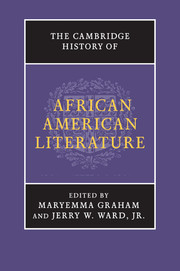Book contents
- Frontmatter
- Introduction
- PART I AFRICAN AMERICAN LITERATURE FROM ITS ORIGINS TO THE TWENTIETH CENTURY
- 1 Sounds of a tradition: the souls of black folk
- 2 Early print literature of Africans in America
- 3 The emergence of an African American literary canon, 1760–1820
- 4 Dividing a nation, uniting a people: African American literature and the abolitionist movement
- 5 African American literature and the abolitionist movement, 1845 to the Civil War
- 6 Writing freedom: race, religion, and revolution, 1820–1840
- 7 “We wish to Plead our own Cause”: independent antebellum African American literature, 1840–1865
- 8 Racial ideologies in theory and practice: political and cultural nationalism, 1865–1910
- 9 The “fictions” of race
- 10 “We Wear the Mask”: the making of a poet
- 11 Toward a modernist poetics
- PART II AFRICAN AMERICAN LITERATURE IN THE TWENTIETH CENTURY
- PART III AFRICAN AMERICAN LITERATURE AS ACADEMIC AND CULTURAL CAPITAL
- Bibliography
- Index
- References
5 - African American literature and the abolitionist movement, 1845 to the Civil War
from PART I - AFRICAN AMERICAN LITERATURE FROM ITS ORIGINS TO THE TWENTIETH CENTURY
Published online by Cambridge University Press: 28 May 2011
- Frontmatter
- Introduction
- PART I AFRICAN AMERICAN LITERATURE FROM ITS ORIGINS TO THE TWENTIETH CENTURY
- 1 Sounds of a tradition: the souls of black folk
- 2 Early print literature of Africans in America
- 3 The emergence of an African American literary canon, 1760–1820
- 4 Dividing a nation, uniting a people: African American literature and the abolitionist movement
- 5 African American literature and the abolitionist movement, 1845 to the Civil War
- 6 Writing freedom: race, religion, and revolution, 1820–1840
- 7 “We wish to Plead our own Cause”: independent antebellum African American literature, 1840–1865
- 8 Racial ideologies in theory and practice: political and cultural nationalism, 1865–1910
- 9 The “fictions” of race
- 10 “We Wear the Mask”: the making of a poet
- 11 Toward a modernist poetics
- PART II AFRICAN AMERICAN LITERATURE IN THE TWENTIETH CENTURY
- PART III AFRICAN AMERICAN LITERATURE AS ACADEMIC AND CULTURAL CAPITAL
- Bibliography
- Index
- References
Summary
African American literature gained a major new writer in 1845 when Frederick Douglass published his Narrative of the Life of Frederick Douglass, An American Slave, Written by Himself. The book was published in Boston by the American Anti-Slavery Society and is perhaps the most significant example of the dynamic connection between the development of African American literature and the abolitionist movement. Douglass was, by this time, well known in antislavery circles. Having escaped from slavery in 1838, he had been working as a professional antislavery lecturer for the Massachusetts Anti-Slavery Society since 1841. He wrote his Narrative both to document his own experiences within the system of slavery and to promote and extend his own efforts for the abolitionist cause. He was quite successful, and at some cost to his personal security. Indeed, owing to the publicity resulting from his detailed account of his life, he was forced to move to Great Britain to avoid being captured and returned to slavery. There he remained until 1847, following the purchase of his freedom by antislavery friends. Douglass's Narrative, in short, is not simply a particularly forceful example of the slave narrative genre but also a reminder that African American literature has often been produced at considerable risk to its authors.
Immediately celebrated as one of the most powerful narratives of its kind yet written, Narrative of the Life of Frederick Douglass was eventually recognized not only as the most influential of all slave narratives but also as a classic work of American literature.
- Type
- Chapter
- Information
- The Cambridge History of African American Literature , pp. 91 - 115Publisher: Cambridge University PressPrint publication year: 2011
References
- 3
- Cited by

